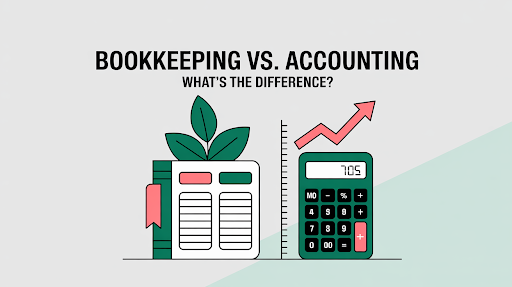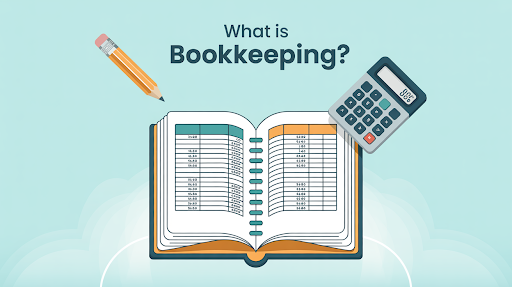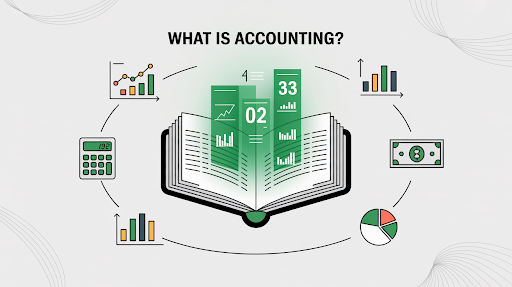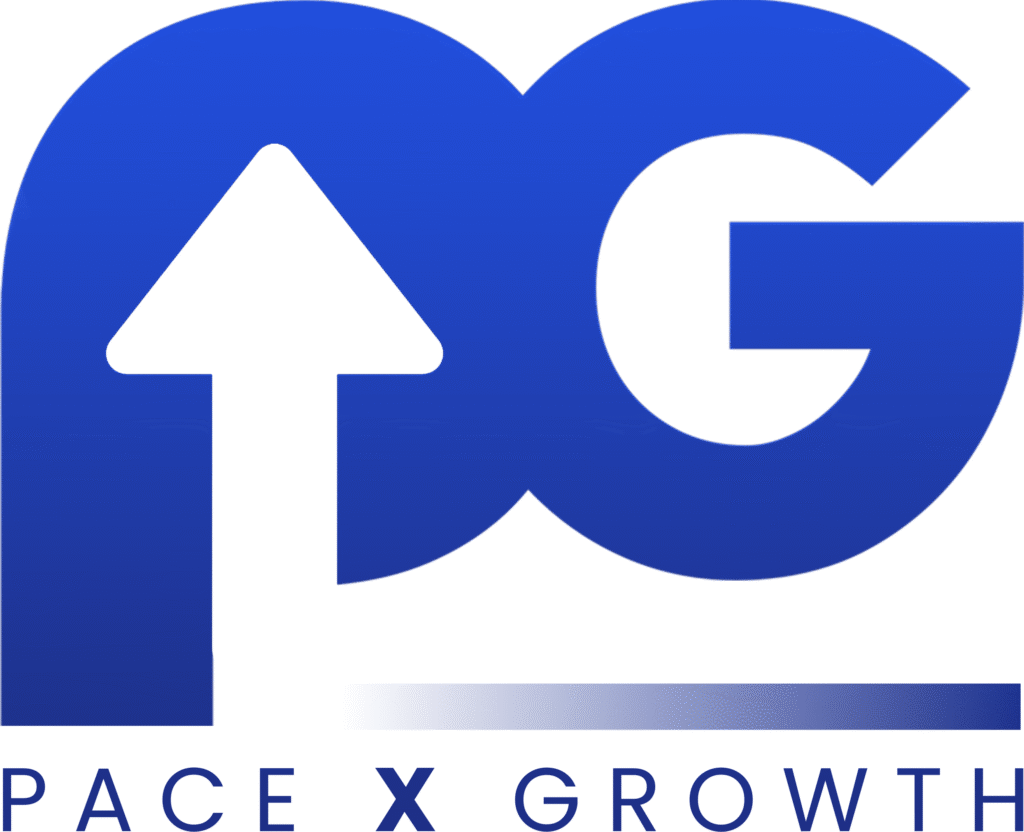
What’s the Difference between Bookkeeping vs. Accounting?
You’re not the only one who is confused with bookkeeping and accounting. This is especially true with new business owners as the terms are often used interchangeably. It is understandable, though, as both involve numbers, finances, and all the workings of your business’s money. But, although bookkeeping and accounting are closely related, they are not the same thing.
We want you to understand why the distinction between these two matters more than just being an intellectual exercise. Knowing the difference can help your financial decision-making, help you choose the professional US accounting solutions, and get more from your bookkeeping and accounting services. In this article, we explain what bookkeeping and accounting are, what they mean to your business, and how both functions will keep your business healthy.
What is Bookkeeping?

Bookkeeping often acts like the unheralded foundation of a company’s financial viability. It records the flow of daily transactions, producing an orderly history of transactions that works for a larger financial management context. Without this constant support, accounting services have little to build upon as they derive their reliability from organized, clean data.
In many companies, bookkeeping will include:
- Keeping a record of sales and purchases
- Taking handle receivables and payables
- Tracking expenditures
- Reconciliations to the Bank
- Maintaining detailed general ledgers
While bookkeeping is not decision-making, it is about accuracy, consistency, and maintaining regularly updated information, the kind of groundwork that makes other finance functions easier.
What is Accounting?

Accounting takes bookkeeper records and provides insight. Accountants drive business decisions by analyzing, interpreting and reporting financial information.
Accounting involves:
- Preparation of financial statements (Income statement, balance sheet, cash flow statement)
- Analysis of business performance
- Budgets and forecasts
- Ensuring compliance and tax filing
- Promoting strategic financial advice
Bookkeeping is about monitoring and measuring, while accounting is about process and planning. Simply, bookkeeping gives you numbers, accounting gives you meaning to the numbers.
What is the Role of Technology in Modern Bookkeeping and Accounting?

For accounting, modern tools offer even greater strategic advantages:
The bookkeeping and accounting services of today have evolved well beyond the typical paper and pen world of tracking their business’ finances. The transformation to digital tools, cloud-based software, and AI-enabled analytics not only made the tracking of a business’ finances more efficient, but the method of gathering, processing, storing and interpreting financial information was completely transformed. Many businesses have a faster, and more accurate accounting and bookkeeping processes; a more integrated system; and real time visibility into their financial position.
For bookkeeping, technology has eliminated much of the repetitive manual processes that used to occupy hours of employees’ time:
- Automated bank feeds provide a seamless option for transaction data expansion from financial institutions which minimizes the chance of manual entry errors and keeps records up to date.
- Receipt scanning apps let you capture expenses in stride, converting paper receipts into digital files to be categorized and stored immediately.
- Real time reconciliation means accounts are continually aligned to the bank records, so differences will be discovered early while they are still manageable to address and will not become expensive issues.
- Cloud platforms support secure, remote access to financial reports and data anytime and anywhere. This enables teams and decision-makers to collaborate without geographical boundaries.
- Data analytics using AI goes beyond standard reporting by providing pattern recognition, predicting cash flow changes, and providing examples of cost savings.
- Digital dashboards enable visuals of important metrics, allowing easier understanding and actionability of complex data for planning within the business.
Choosing the right US accounting solutions means looking for applications that work well together and allow bookkeeping and accounting to function as one system. Seamless connections between the two applications allow data flow in one direction and make the information that informs business decisions accurate, up to date, and easy to obtain. For many organizations, this amalgamation of technology and capability creates a harder, more flexible base of operation – providing an efficient basis for their transactional procedures to maximize growth.
Signs It’s Time to Hire a Professional

In the early days of a business, it’s not unusual for owners to handle bookkeeping and accounting themselves. Basic spreadsheets, entry-level software, and a manageable number of transactions make it possible for a while. Over time, though, the demands on financial management grow, and the risks of errors, missed deadlines, or incomplete reporting increase.
Some indicators often suggest that it may be time to consider outsourcing to professional bookkeeping and accounting services:
There are some clues that may indicate that it is time for you to consider engaging professional bookkeeping and accounting services:
- Missing reconciliations: When we do not reconcile accounts or check them against bank statements on a regular basis, small problems can easily become large reporting problems over time.
- Annual tax season: Every year, collecting paperwork, checking for compliance, and filing all of our documents at tax time is a stressful event that can be helped by using an expert in the field.
- Lack of clarity on profitability: When it is unclear where our revenue is coming from, or which costs are impacting the profit margins on specific service lines/projects or initiatives, as an owner, you need some professional input.
- Financing requirements: When you need to put together a formal loan application or find an investor or bid on a major contract, the documentation needed is normally a financial statement prepared in accordance with recognized accounting standards i.e. IFRS.
- Plans for growth and have no financial forecasts: If you want to grow your business, you need a good grasp of your projected cash flows, operational costs, and funding requirements, to assess growth plans and to prevent risk.
- Regulatory compliance concerns: As your industry experiences changes, so do new reporting rules or new tax obligations. Professionals can assist in ensuring that you achieve compliance, within minimum disruption to the business.
For many organizations, the shift to professional services is not about losing control of finances, but about gaining clarity, efficiency, and strategic direction. Partnering with a provider that offers both bookkeeping and accounting services, ideally supported by advanced US accounting solutions, allows business leaders to focus on growth while maintaining confidence in the accuracy and compliance of their financial data.
How to choose a professional US accounting solutions company?

Selecting a provider is not just about outsourcing tasks, it’s about building a long-term relationship with a team that understands your business’s unique financial landscape. The right partner doesn’t simply record transactions or prepare reports; they become an extension of your business, offering guidance and support that adapts as your company evolves.
Here are some characteristics you could evaluate to determine a strong fit in a prospective partner:
- Industry experience: A partner who understands your industry can offer insights into your challenges and understand sector specific regulations and financial risk.
- Clear pricing: Transparent and predictable fee schedules mean no surprises and better budgeting.
- Use of US based cloud technology solutions: Cloud based technology for bookkeeping and accounting systems integrate seamlessly and provide a secure data environment, with accuracy and efficiency.
- Positive client testimonials: We all tend to trust reputations. A partner will demonstrate they have provided a quality service to their clients in the past. Client comments and success stories are an additional insight into the quality of service and the amount of satisfaction their clients receive.
- Ongoing service and advice: The most valuable partnerships provide more than financial reporting services on a regular basis; they include trustworthy advice and high level strategic support that help improve and guide your business.
Conclusion
Bookkeeping and accounting are two of the financial processes that are unique but interrelated – bookkeeping collects the detail while accounting interprets the detail for decision making. Together, they almost represent the foundation for an organization to grow sustainably.
For an organization that wishes to grow sustainably, without the burden of doing everything internally, finding the right combination of bookkeepers and accountants that suits their size and industry, is critical. At Pacexgrowth, we provide bookkeeping and accounting services using secure and modern US accounting solutions, for a reasonable cost that can ensure your accounting records remain accurate, compliant and allow you to focus on developing good information. With the right partner, the purpose of an organization can remain focused on developing new models, maintaining relationships with customers and organizational growth, knowing that the finance costs, processes and compliance is taken care of by dedicated and experienced professionals.
Is Your Financial Story a Best Seller or a Horror Story?
We help you edit, refine, and rewrite the narrative to ensure it has a very profitable ending.

